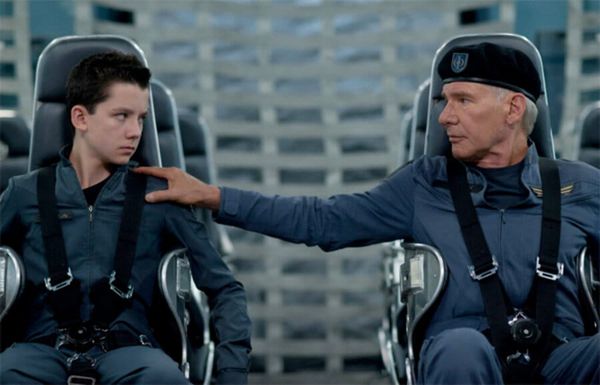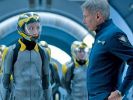Eye For Film >> Movies >> Ender's Game (2013) Film Review
Ender's Game
Reviewed by: Amber Wilkinson

The alien wars onscreen in Ender's Game have been, prior to its release, dwarfed by the battle raging over the extremist views held by the author of the original book. Orson Scott Card has earned himself a call for the movie to be boycotted thanks to his particularly crackpot stance on homosexuality, which he thinks should be outlawed. It would be a shame if this stopped youngsters seeing this on the big screen as, ironically, the main messages of the original book and film - adapted and directed by Tsotsi's Gavin Hood - are that prejudice is a force for evil and compassion wins more battles than violence.
In this respect, Ender's Game is a cut above a lot of sci-fi action films for teenagers, confronting them not just with special effects, but with a decent debate concerning the morality and politics of war. Here the violence is not presented as simply a way of bumping off your enemy or halting a bully in their tracks but as an unpredictable and unwelcome aspect of human nature that our hero Ender Wiggin is desperate to control. This is a particular problem for the youngster as all of the adults around him are only seeking to hone and fuel it. We are, of course, in a not-too-distant future, where the world is at war with an alien race - which given our track record on our own planet this century, is hardly much of a reach.

The Formics - ant-like creatures that recall some of the bad guys in Starship Troopers - tried to invade Earth but were beaten back to their home planet. Now, those in charge want to end the race for good. They are training children for the purpose via an elaborate and brutal regime at a space-station because their younger brains are better able to assimilate the computer know-how needed to command huge forces and, although it is never voiced, because they are at the malleable and volatile coming-of-age stage of life.
Asa Butterfield, as Ender, and the rest of the young cast have been well chosen. There is no doubt that we are looking at teenagers and this makes the violence they embark on much more hard-hitting than in many similar films which soften the blow by casting twentysomething actors in younger roles. When Ender is kicking a bully towards a long stay in hospital, we genuinely feel the sharp hunger of his violence and his shock of remorse.
Even as Hood starts to take us through some familiar movie motifs, such as an outsider helping to form a team or rivals going head to head, he retains a moral complexity to Ender. Things are never easy for him, either in his passage through the battle school under the tutelage of the win-at-all-costs Colonel Hryum Graff (Harrison Ford) or in terms of his own moral development. There isn't a cheap 'lightbulb' moment here but rather a sense of a boy picking his way through a moral maze not entirely of his own making. Given that the book was published way back in 1985, it is also surprisingly resonant when you consider our methods of modern warfare. Hood sticks to the book and, in doing so, keeps its punch of an ending, its lack of triumphalism a refreshing change.
Ender's Game may not offer quite the spectacle of some other blockbusters - and it could do without the stunt casting of Ben Kingsley with one of his oddest accents to date - but when it comes to giving its target teenage audience something to think about, it wins the fight.
Reviewed on: 25 Oct 2013

















